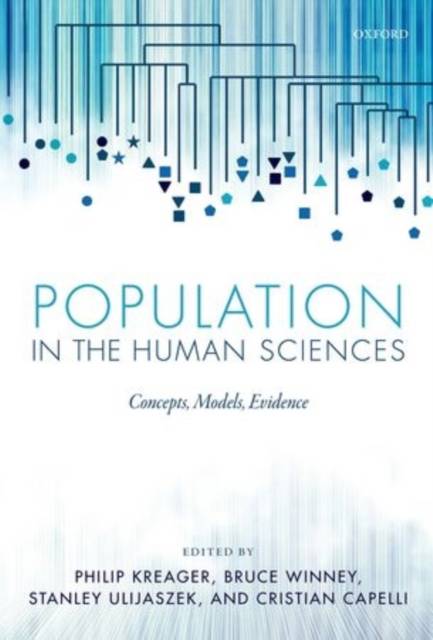
- Afhalen na 1 uur in een winkel met voorraad
- Gratis thuislevering in België vanaf € 30
- Ruim aanbod met 7 miljoen producten
- Afhalen na 1 uur in een winkel met voorraad
- Gratis thuislevering in België vanaf € 30
- Ruim aanbod met 7 miljoen producten
Zoeken
Population in the Human Sciences
Concepts, Models, Evidence
Hardcover | Engels
€ 225,95
+ 451 punten
Omschrijving
The Human Sciences address problems in nature and society that often require coordinated approaches of several scientific disciplines and scholarly research, embracing the social and biological sciences, and history. When we wish, for example, to understand how some sub-populations and not others come to be vulnerable, why a disease spreads in one part of a population and not another, or which gene variants are transmitted across generations, then a remarkable range of disciplinary perspectives need to be brought together, from the study of institutional structures, cultural boundaries, and social networks down to the micro-biology of cellular pathways, and gene expression. The need to explain and address differential impacts of pressing contemporary issues like AIDS, ageing, social and economic inequalities, and environmental change, are well-known cases in point. Population concepts, models, and evidence lie at the core of approaches to all of these problems, if only because accurate differentiation and identification of groups, their structures, constituents, and relations between sub-populations, are necessary to specify their nature and extent. The study of population thus draws both on statistical methodologies of demography and population genetics and sustained observation of the ways in which populations and sub-populations are formed, maintained, or broken up in nature, in the laboratory, and in society. In an era in which research needs to operate on multiple levels, population thinking thus provides a common ground for communication and critical thought across disciplines. Population in the Human Sciences addresses the need for review and assessment of the framework of interdisciplinary population studies. Limitations to prevailing postwar paradigms like the Evolutionary Synthesis and Demographic Transition were becoming evident by the 1970s. Subsequent decades have witnessed an immense expansion of population modelling and related empirical inquiry, with new genetic developments that have reshaped evolutionary, population, and developmental biology. The rise of anthropological and historical demography, and social network analysis, are playing major roles in rethinking modern and earlier population history. More recently, the emergence of sub-disciplines like biodemography and evolutionary anthropology, and growing links between evolutionary and developmental biology, indicate a growing convergence of biological and social approaches to population.
Specificaties
Betrokkenen
- Uitgeverij:
Inhoud
- Aantal bladzijden:
- 628
- Taal:
- Engels
Eigenschappen
- Productcode (EAN):
- 9780199688203
- Verschijningsdatum:
- 12/05/2015
- Uitvoering:
- Hardcover
- Formaat:
- Genaaid
- Afmetingen:
- 180 mm x 246 mm
- Gewicht:
- 1247 g

Alleen bij Standaard Boekhandel
+ 451 punten op je klantenkaart van Standaard Boekhandel
Beoordelingen
We publiceren alleen reviews die voldoen aan de voorwaarden voor reviews. Bekijk onze voorwaarden voor reviews.







